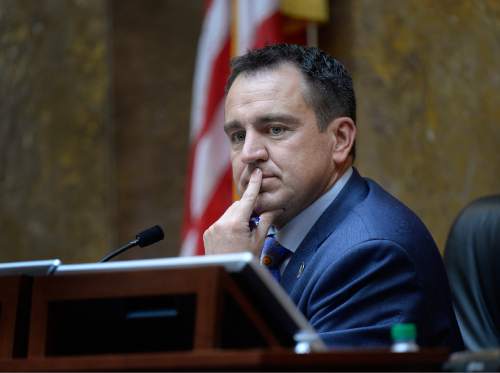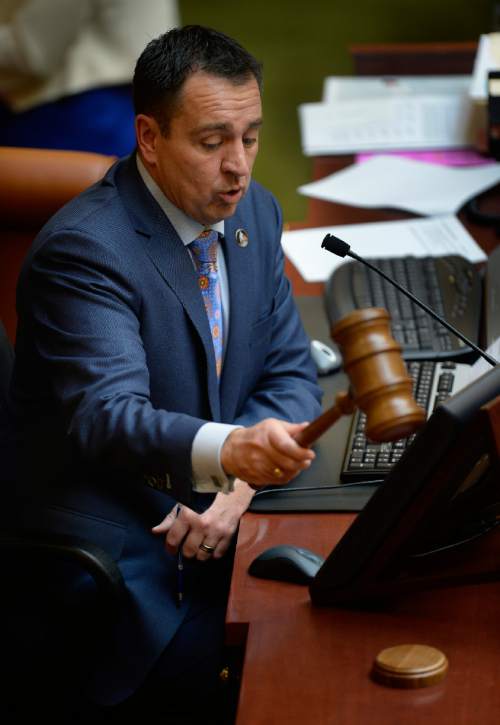This is an archived article that was published on sltrib.com in 2015, and information in the article may be outdated. It is provided only for personal research purposes and may not be reprinted.
A Salt Lake Tribune editorial cartoon recently depicted a mobsterlike Utah House Speaker Greg Hughes machine-gunning Gov. Gary Herbert's alternative for expanding Medicaid, while the governor and Senate leaders watch in horror.
Hughes, R-Draper, says he knows people see him as an obstructionist. But he issued a message Tuesday that reaching a compromise on the topic by this summer is not only possible, but also probable — and he pledged to help it happen.
"I'm optimistic," he told the Tribune editorial board. "I think we have a track record for getting big things done, and I think we can. That is the mindset moving forward."
He noted the Legislature figured out compromises this year on nondiscrimination legislation, a gasoline tax hike and prison reform — which had been contentious for years — so it can also find an alternative way to expand Medicaid.
One reason to be upbeat, he said, is that House Republicans already have moved further on the issue than most Utahns realize. He said most members started the legislative session inclined not to do anything on Medicaid expansion, believing federal officials might provide better waivers if they waited another year.
"The caucus continually moved to a place where we could provide health care to people who don't have it," he said, with most voting for the so-called Utah Cares plan pushed by House Majority Leader Jim Dunnigan, R-Taylorsville.
It would cover those living in poverty who lack Medicaid. Hughes said it is sustainable because it is financed by a 70-30, federal-state match in which Utah can set funding and coverage levels as it sees fit.
A big portion of those poor people, however, would be covered under the state's bare-bones Primary Care Network, which provides no insurance for hospitalization, specialist care and many diagnostic tests.
Herbert and the Senate instead supported the governor's Healthy Utah plan. The two-year pilot program would cost less far less, cover more people and provide better care than the House plan, taking advantage of a 90-10, federal-state match.
Hughes said the House figures that enhanced match will disappear, and the poor will complain if better coverage vanishes as well. So he said the House wants to offer only what is likely to be continued.
"My frustration is that the House looked like the obstructionist," Hughes said. "We looked like we were potentially the ones with our heads in the sand and didn't want to do anything."
After the Senate passed the governor's plan, Hughes declared it dead on arrival in the House and said no hearings on it would be held. He later relented, but Healthy Utah fell short in the House anyway.
"The only purpose of me saying that ... was really to signal that we've got to get something we can all work on," Hughes said. "It wasn't interpreted that way. It looked like I was being an obstructionist. It looked like maybe I was interrupting the process. I regret that."
He said a key for moving forward is for state leaders to travel to Washington to push for concessions House members seek, including allowing Utah to cap how much it will spend for expansion.
"If they could just let us budget to the projections we have," he said, "we could do it" and finish the deal.
Hughes said it is in the interest of the Obama administration to be more flexible because 22 states still have not expanded Medicaid under provisions of the Affordable Care Act. Others could follow if Utah finds a sustainable deal.
"If Utah is going to be a model," he said, "you have to hear our concerns."
Herbert also has committed to finding a compromise as he and legislative leaders continue negotiations.
"We're going to resolve this ... the Utah way," Herbert said at a news conference last week. He said he intends to call a special session later in the summer to vote on whatever agreement leaders reach.





